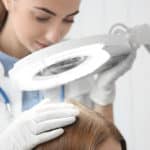What Are the Biggest Skin Issues for Menopausal Women?
Women between the ages of 40 and 58 may be entering or fully immersed in menopause, and in addition to the telltale hot flashes and night sweats that can be so upsetting to experience, your skin may experience some noticeable if not dramatic changes. Namely, you may find your skin to be much drier more often than you used to. Those days of youthful, dewy skin are numbered, or over, and you’re now facing a never-ending new reality of dry, itchy skin that never seems to get fully better with a nightly slathering of moisturizer.
Since dry skin is one of the biggest skin issues for menopausal women, it’s important to understand what may be causing it. As you age, your estrogen levels drop, and that can lead to a reduction in what estrogen creates for your body: oil production and the ability to retain moisture within your skin. Hormonal changes in estrogen levels are drying you from the inside out. So that moisturizer isn’t going to fix the problem entirely. It will certainly bring you some topical softness, but without higher estrogen levels, your dry skin in menopause will continue.
To help improve your dry skin issues on your face and body, here are some easy tips for your skincare regimen:
Wear sunscreen
A broad spectrum sunscreen with at least an SPF of 15 or higher will help keep skin healthy while protecting your skin from the sun’s harmful UV rays.
Change Your Diet
We recommend that you incorporate more healthy fats into your diet. Essential fatty acids, such as omega 3s found in salmon, walnuts and fortified eggs, helps produce an oil barrier for your skin, helping to keep your moisture within your body. (Omega 3s are also indicated to help prevent acne.) More importantly, drink lots of water to hydrate from the inside out.
Change Your Shower Routine
Hot, steamy showers dry out your skin further, so turn down the hot water to warm, and help your skin keep some of its moisture levels. Make sure that you don’t scrub your skin during showers. Harsh friction on your skin can strip away protective layers and oil barriers, leading to drier skin, so ease up on your cleansing pressure and use a soft, natural material, non-abrasive washcloth.
Secondly, be sure to use a gentle soap. Scented, antibacterial or deodorant soaps can remove your body’s essential oils, leading to dryness, and some soaps labeled as all-natural or organic may also be a skin dryness culprit by not removing enough dead skin cells and dirt. Talk to your dermatologist about recommended soaps and skin products. Finally, moisturize within minutes of your warm shower. Again, ask your dermatologist for moisturizer recommendations for your menopausal skin’s health.
Reevaluate Your Skin Care Products
Your dermatologist can recommend milder moisturizing soaps to help prevent dry skin on your face and hairline. Your dermatologist might recommend topical antioxidants such as vitamin C or green tea. Other moisturizers recommended by the experts include shea butter, hyaluronic acid, and lactic acid. It may also be beneficial to discuss chemical peels with your dermatologist. A mild form of safe and effective exfoliation can remove dead skin layers and present more youthful-looking skin, when chosen and applied by your doctor.
Start Exercising
Get plenty of exercise, since exercise increases the amounts of oxygen and nutrients that make it to your skin, and exercise can increase your collagen levels, a key substance that helps keep your skin plumper and as youthful as possible.
What To Do Next?
If you’re approaching or in menopause, you may also find that you’re experiencing more acne than usual. Perhaps you haven’t had a problem with acne since you were a teenager just getting your estrogen hormone levels up, and now here are those upsetting breakouts again. Talk to your dermatologist about acne medications and acne treatments to help reduce breakout occurrences and severity.
And yes, wrinkles may start to appear on your skin as you lose estrogen and collagen. If wrinkles are starting to cause you concern about your appearance, and if they’re causing you emotional distress about the quick march of aging you’re experiencing, your dermatologist has a wide variety of wrinkle-fighting treatments to help return your skin to a smoother surface. You might opt for Botox or other skin-smoothing, FDA-approved injectables, or laser skin treatments that can improve fine lines and wrinkles.
As your collagen levels decrease, you may be noticing some sagging or thinning of your skin, which your doctor can also improve with injectables such as Juvederm to insert hyaluronic acid into your skin, creating new collagen naturally, and giving your face a fresh boost of volume and contour.
However your skin is ‘misbehaving’ as you enter menopause, your dermatologist can help you turn back the clock, in a sense, with treatments from the inside out, as well as topical treatments to keep your skin looking and feeling its best, and paired with in-office, non-surgical dermatology treatments, your own smart skin self-care regimen can vastly improve any symptoms that menopause has brought to you.





